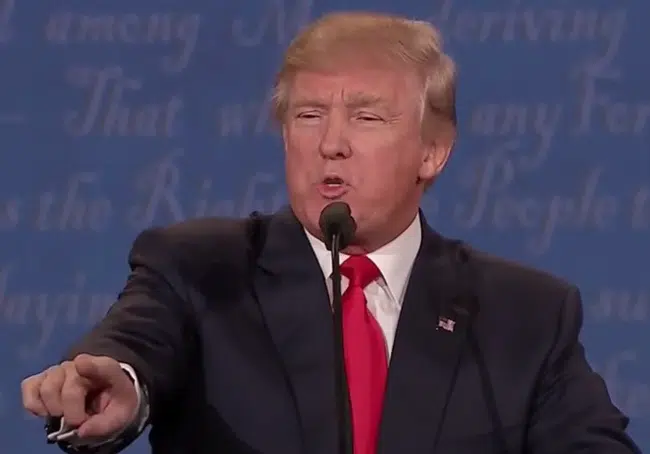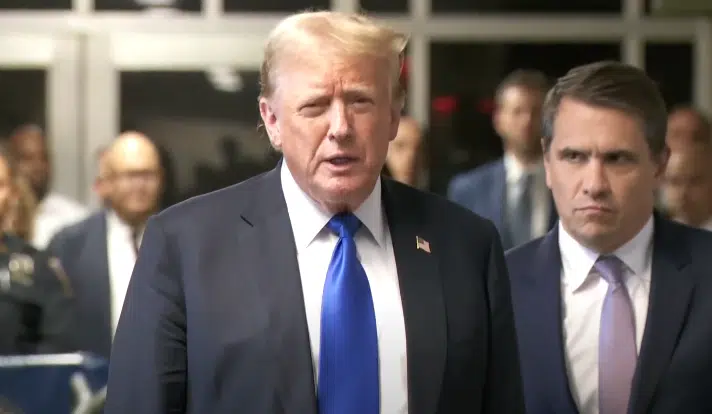
If former President Donald Trump is sentenced to jail by New York City judge Juan Merchan on July 11, prior to the Republican National Convention on July 15 to July 18, then Trump’s June 27 debate with President Joe Biden might be the last the American people get to hear from Trump for the rest of the general election.
That’s right. Trump, even as he continues leading national polls on average since Sept. 2023, might not even be able to attend his own nominating convention and deliver his acceptance speech after nearly sweeping the entire primaries, winning 49 out of 50 states, because the conviction by the New York City jury and the decision by Merchan for sentencing on July 11 will predate the Republican Party’s convention on July 15 to July 18.
Meaning, all eyes will be on not only incumbent President Joe Biden’s performance — with continued talk of replacing Biden — in the June 27 debate just a week away, but also Trump’s, who will need to outline his positive agenda for the American people in just 90 minutes — with the chance he will be unable to deliver any further messages directly on the campaign from behind bars.
Not only is potentially imprisoning a former president unprecedented in the nation’s history, so is putting one of the major party’s nominees in jail in an election year. One must look at banana republics overseas or examples in antiquity including the Roman Republic to find such divides resulting in political factions attempting to imprison one another in this manner, which risks civil war and can result in dictatorships being established in their wake by the victorious faction.
In other words, it’s incredibly dangerous for which there are well-known historical examples, with the U.S. recklessly repeating those mistakes.
For Trump, though, the phenomenon is actually nothing new, whose first federal counterintelligence investigation began during the 2016 campaign by the State Department, the Justice Department and the nation’s intelligence agencies. Surveillance was justified to the Foreign Intelligence Surveillance Act (FISA) court not only the basis of false accusations that he was a Russian agent but also on Trump’s opposition to U.S. intervention in Ukraine after former Ukrainian President Viktor Yanukovych was deposed, Russia annexed Crimea and the civil war there broke out in 2014.
The investigation carried on through the campaign and continued even after he won, in the presidential transition, and then even after he took office in Jan. 2017. Afterward, when the top-secret investigation was discovered by the Trump administration, he fired the FBI Director leading it, James Comey, and Special Counsel Robert Mueller was appointed, only for Mueller to debunk the conspiracy theory in his report: “[T]he investigation did not establish that members of the Trump Campaign conspired or coordinated with the Russian government in its election interference activities,” and “the evidence does not establish that the President was involved in an underlying crime related to Russian election interference.”
But the attempts to criminalize the Trump presidency would not end there. In 2019, Trump would be impeached and ultimately acquitted as he considered leveraging foreign aid to Ukraine.
For eight years now, the “get Trump” by all means necessary push by Democratic prosecutors has steadily escalated, with the New York City trial now over, and the Washington, D.C., Miami, Fla. and Fulton County, Ga. trial still pending.
At the debate, Trump will attempt to hold Biden accountable for the political prosecutions, while Biden will expectedly note that his own son, Hunter, was just convicted of federal gun charges as well, without the President intervening with a pardon or commutation of his sentence (yet), designed to show that America’s justice system is “even-handed”.
But all it really shows is that targeting the President, his family or a former President with prosecution has become normalized — and the U.S. will never be the same.
Will the debate’s moderators even ask any other questions about the issues of the campaign? Surely, there’s a lot to talk about, whether it be consumer inflation still outpacing personal income since the beginning of 2021, the collapse of the U.S. southern border with millions of illegal immigrants pouring across the border, how to deal with the ongoing wars in Ukraine or Gaza or potential conflict with China over Taiwan, collapsing fertility, the skyrocketing $34.7 trillion national debt and so forth.
The problem with these escalations is that once the political factions are warring with one another, few other issues matter, as the pivotal decisions shift from millions of Americans voting in a normal election to the few who serve as prosecutors, judges and juries who appear intent on seeing the inquisitions to their arbitrary conclusion. Whether Trump could still effectively campaign from prison is important for both he and Republicans to consider, but going into the debate, Trump must assume this could be one of his last chances to communicate directly with the American people.
Robert Romano is the Vice President of Public Policy at Americans for Limited Government Foundation.







